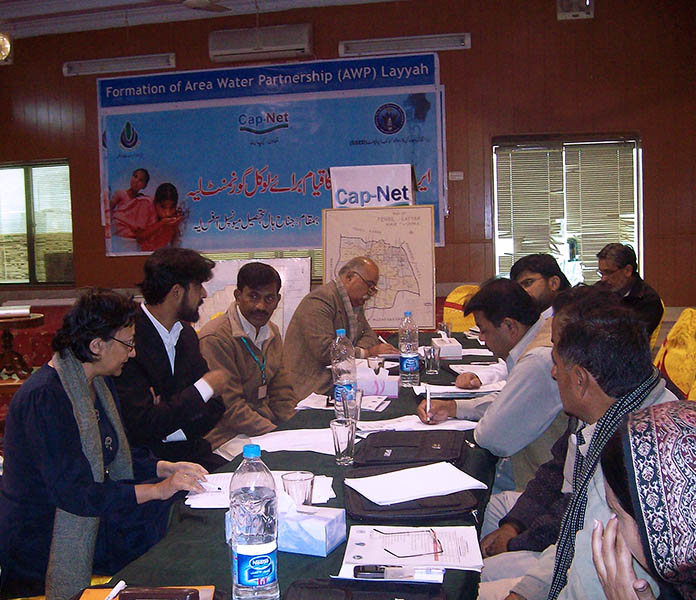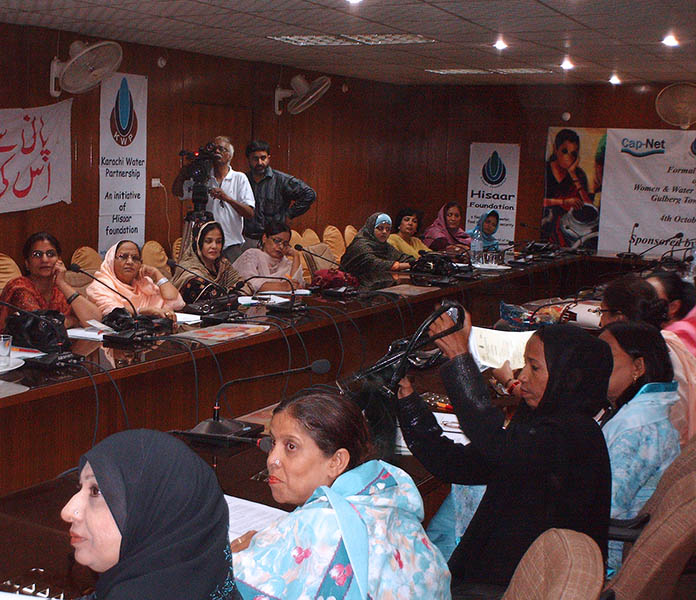Creating Partnerships
We strive to build a neutral platform for bringing together all stakeholders of the water sector to address the water crisis in Pakistan. Building bridges with government is a key area of our work, because the Board and staff believe that the government must accept its responsibilities and carry out its assigned functions. We also believe that the government and citizens have to work together to take initiatives to scale, even if they are introduced or developed by private sector or civil society. For this purpose we have fostered partnerships at all levels – local, national, regional and international to achieve our goals.
Some of our partnerships are highlighted below
Some of our partnerships are highlighted below

Area Water Partnership
Hisaar Foundation has played an integral role in anchoring and emulating the Area Water Partnership concept which emerged in South Asia out of the need to find tangible and feasible units for institutionalizing Integrated Water Resources Management in countries like Pakistan where the river basins are huge and unwieldy.
GWP South Asia pioneered Area Water Partnerships (AWPs) in 2001 as a mechanism to promote dialogue and local action among stakeholders on water resource management issues that affects their lives and livelihoods. The AWPs are innovative, local level informal institutions and have demonstrated the ability to integrate the stakeholders and institutions both horizontally and vertically, and unlocked tremendous potential in dealing with issues of water management and poverty.
Using the conceptual framework of AWPs, we developed the model of Karachi Water Partnership (KWP) which was launched in April 2007 and is now recognized as the first Urban Water Partnership (UWP) in the world.

Area Water Partnership
Hisaar Foundation has played an integral role in anchoring and emulating the Area Water Partnership concept which emerged in South Asia out of the need to find tangible and feasible units for institutionalizing Integrated Water Resources Management in countries like Pakistan where the river basins are huge and unwieldy.
GWP South Asia pioneered Area Water Partnerships (AWPs) in 2001 as a mechanism to promote dialogue and local action among stakeholders on water resource management issues that affects their lives and livelihoods. The AWPs are innovative, local level informal institutions and have demonstrated the ability to integrate the stakeholders and institutions both horizontally and vertically, and unlocked tremendous potential in dealing with issues of water management and poverty.
Using the conceptual framework of AWPs, we developed the model of Karachi Water Partnership (KWP) which was launched in April 2007 and is now recognized as the first Urban Water Partnership (UWP) in the world.
Women and Water Networks
Women and Water Networks (WWN’s) have emerged as a powerful tool that seeks to highlight women’s problems, perceptions, perspectives and needs in the water sector. WWN’s aim to bring into the fold women from all sectors of society such that their voice can be effectively channeled into mainstream policies, discussions and actions relating to water. Hisaar Foundation is the host organization of the WWN Pakistan which has over 250 members and several chapters across the country. WWN Pakistan is also a part of the South Asia Women and Water Network


Women and Water Networks
Women and Water Networks (WWN’s) have emerged as a powerful tool that seeks to highlight women’s problems, perceptions, perspectives and needs in the water sector. WWN’s aim to bring into the fold women from all sectors of society such that their voice can be effectively channeled into mainstream policies, discussions and actions relating to water. Hisaar Foundation is the host organization of the WWN Pakistan which has over 250 members and several chapters across the country. WWN Pakistan is also a part of the South Asia Women and Water Network

Women and Water in Central and South Asia
Hisaar Foundation joined hands with George Washington University, to collaborate on the Women and Water in Central and South Asia project that connected women in Central and South Asia to water and its management. The program consisted of international exchange of knowledge and leadership to support innovative conflict resolution with a sustainable and multiplying effect.
WWCSA had young female social entrepreneurs and activists from Kyrgyzstan, Tajikistan, Afghanistan, Pakistan and India. WWCSA featured discussions of experiences and innovative solutions on community-level water management, technical sessions to enhance participants competencies and leadership skills, and exposure to U.S institutions and the policy community working on water management and gender issues.

Women and Water in Central and South Asia
Hisaar Foundation joined hands with George Washington University, to collaborate on the Women and Water in Central and South Asia project that connected women in Central and South Asia to water and its management. The program consisted of international exchange of knowledge and leadership to support innovative conflict resolution with a sustainable and multiplying effect.
WWCSA had young female social entrepreneurs and activists from Kyrgyzstan, Tajikistan, Afghanistan, Pakistan and India. WWCSA featured discussions of experiences and innovative solutions on community-level water management, technical sessions to enhance participants competencies and leadership skills, and exposure to U.S institutions and the policy community working on water management and gender issues.
CAP-NET
Cap-Net Pakistan was established in 2008 with Hisaar Foundation as its Secretariat. Since then, Cap-Net Pakistan in collaboration with Hisaar Foundation its network partners has been striving to development the knowledge base for IWRM processes and implement IWRM solutions. The focus of the Cap-Net Pakistan network partners including Hisaar Foundation has been to establish a knowledge base for IWRM in the context of Pakistan under different local conditions and find IWRM solutions that are appropriate, with a special emphasis on safe drinking water, safe sanitation, water conservation and adaptation to climate change.
The focus of the network activities has been on capacity building of relevant stakeholders in sustainable water management as well mainstreaming women’s voices in the water sector.
For further information please visit: cap-net.org


CAP-NET
Cap-Net Pakistan was established in 2008 with Hisaar Foundation as its Secretariat. Since then, Cap-Net Pakistan in collaboration with Hisaar Foundation its network partners has been striving to development the knowledge base for IWRM processes and implement IWRM solutions. The focus of the Cap-Net Pakistan network partners including Hisaar Foundation has been to establish a knowledge base for IWRM in the context of Pakistan under different local conditions and find IWRM solutions that are appropriate, with a special emphasis on safe drinking water, safe sanitation, water conservation and adaptation to climate change.
The focus of the network activities has been on capacity building of relevant stakeholders in sustainable water management as well mainstreaming women’s voices in the water sector.
For further information please visit: cap-net.org
